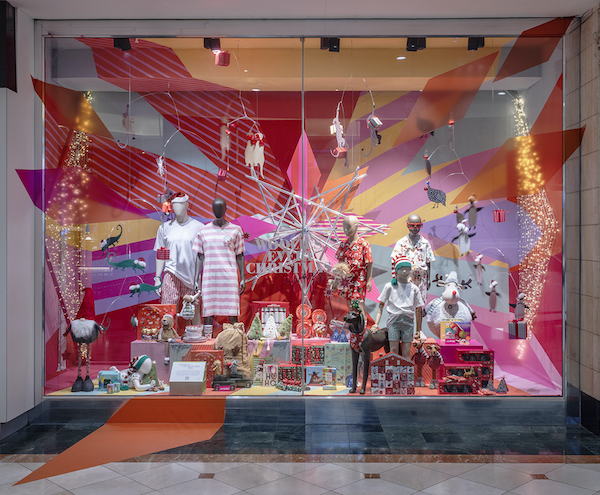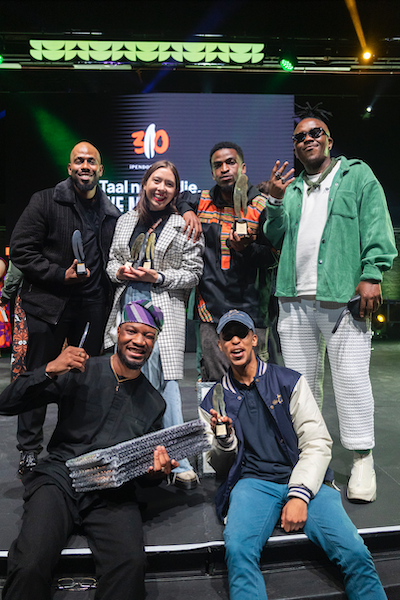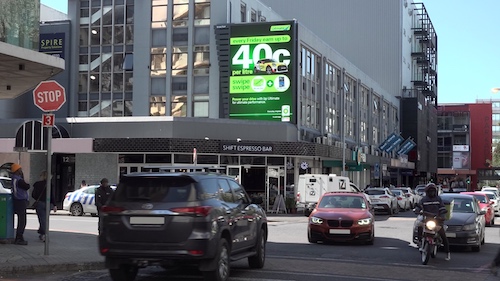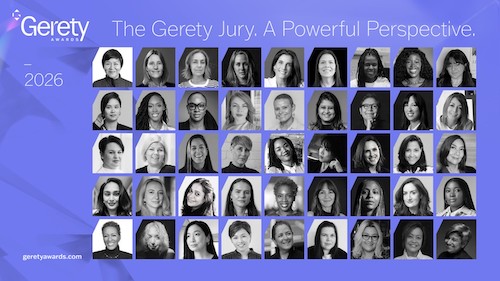For the second year running, Souper Troopers, the NPO supporting Cape Town’s most marginalised residents, has teamed up with creative marketing agency VM Central to bring festive sparkle to Woolworths’ 2025 Christmas season. Together, they’ve transformed used aluminium foil into hundreds of upcycled silver starbursts, creating sustainable and eye-catching window displays that celebrate the season while highlighting the power of creativity and social impact.
‘This year, we’ve shown that one person’s trash can become another’s vision,’ said Kerry Hoffman, Souper Troopers founder. ‘Even more rewarding has been seeing the sense of hope, accomplishment, and pride in our Troopers, who never imagined they’d create the magic in Woolworths’ Christmas windows. This is truly a priceless gift – for us and for those we support on their journey beyond homelessness.’
Since July 2025, VM Central has been working with the Troopers at The Humanity Hub, bringing a fresh creative concept to life while training, upskilling and supervising production. This year, 15 Troopers supplied VM Central with 140,000 foil-covered straws, which were transformed into 700 stars for Woolworths’ window and in-store displays. The team also rolled foil onto sticks, creating starbursts scattered throughout the stores. Altogether, the decorations feature in 18 Woolworths stores nationwide, with the Troopers upcycling more than 2700 kilograms of used foil that would otherwise have gone to landfill — turning it into magical, sustainable festive displays.
Created in 2014, Souper Troopers operates The Humanity Hub in Woodstock, where its team provides a comprehensive range of services to help homeless people transform their lives, working tirelessly to bring dignity to hundreds of Troopers.
Job upliftment is a key priority, and the collaboration with VM Central and Woolworths began in 2024, when VM Central approached the NPO. ‘Last year, we wanted to replace the usual foil vinyls in Christmas displays with something more sustainable,’ explained Nadia van der Zandt of VM Central. Troopers collected and cleaned discarded foil, covering paper strips, birds, branches and baubles to bring sparkle to the displays. ‘They basically put the shine and magic into the Christmas windows,’ said Van der Zandt.
‘The learning curve was massive and it gave us the production knowledge, as well as the planning and communication skills we needed to be truly prepared for the 2025 Christmas season, which was more demanding,’ explained Souper Troopers Manager, Moeshfieqah Bosch.
‘It’s all about giving people from the street the opportunity to heal their wounds in a safe place and get busy,’ said Hoffman. ‘Their creativity literally shines in Woolworths’ Christmas windows, and that’s something they are incredibly proud of. They are an inspiration to all those who have never valued themselves or felt they had a place of respectability in society.’
The purposeful handiwork is therapeutic to the team of makers, all on their journey from homelessness to ‘homefullness.’ “’he straws can’t be too loose, they can’t be too tight, they have to be perfect,’ explained Trooper Ruwayda Koopman. ‘It helps take your mind off your daily stress.’ The process also builds teamwork, as the team must collaborate to meet project targets. ‘Souper Troopers opened my eyes to see that the world is not a scary place; it’s a bright place,’ added Trooper Logan Bailey.
‘The Woolworths and VM Central partnership is huge for us, creating a stream of new followers and supporters — corporates, individuals, and retailers,’ said Hoffman. ‘South Africans are recognising the value of the work we do and how simple it actually is to transform lives when you treat people with dignity, love and respect. There are thousands more on the streets who just want to be given a chance, and our hope is to expand our reach to all those serious about making a change for the better.’
In 2022, thanks to the generosity of Swindon Property, Souper Troopers moved The Humanity Hub from the Community Chest building on Bree Street to a standalone building in Woodstock, enabling the organisation to grow in leaps and bounds. In recent years, it has developed the African Worry Dolls upliftment programme, facilitating Troopers in creating one-of-a-kind miniature dolls from recycled materials. The dolls are sold locally and overseas, helping Troopers develop job skills and generate revenue to support Souper Troopers’ services. The NPO can also be supported through the purchase of its premium Troopers coffee, both available on the Souper Troopers website.
‘It is such a blessing working with Souper Troopers,’ said Van der Zandt. ‘Their enthusiasm and dedication to making beautiful things makes the work fun. I have loved working with the team—they are so creative and always come up with good solutions to streamline projects. They are excited and engaged no matter how mad our ideas are, which is a joy.’
‘You could say this has been an exercise in sustainability at the most human level,’ added Bosch. ‘Just like we used recycled foil, we can recycle our lives.’
WOOLWORTHS
http://woolworths.co.za/
















